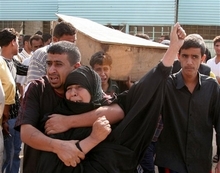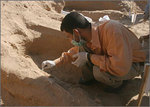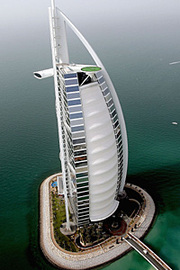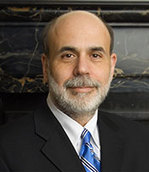The following is a work of fiction. Here is the Table of Contents, which is updated as new chapters are written.
The Duke of Oil is the third in a series of sci-fi novels of the type known as
alternate history. What’s different is that this series takes place in
our time, with characters familiar in your real life.
The first book in the series, The Chinese Century, was written late 2004. Its table of contents is here. The second, The American Diaspora, was written in 2005. The table of contents for that book is here.
A synopsis of the series is here.
As with all such things, it started as nothing.
Nothing as far as Cheney was concerned. When the village elders of Ismaniyeh, a small village about 100 clicks southeast of Baghdad, were seized by armed gunmen, assembled in the village square and shot dead, by men wearing kaffiyeh and very dark sunglasses, it was supposed to be just another small piece of the country’s ongoing civil strife.
What began with the American invasion, chaos and murder, was continuing long after the U.S. troops had left. Iran sponsored Shiite death squads, the Saudis and Syrians sponsored Sunni death squads, and Turkey had their own infiltrators against the Kurds.
But on that simple checkerboard not every move made sense. This one didn’t make sense to the rump Iraqi government, and so a rare investigation was launched.
Suspicions were raised when witnesses were found to be cooperative. Sunni sheiks submitted to interviews, and offered as much help as they could. A cellphone file was found of the executions, just 20 seconds long, jerky, but when it was analyzed there were some curious findings.
One assassin scratched himself with his right hand. A real Iraqi would use his left, only. The men wore boots with pointed toes. The face behind one set of sunglasses looked Russian when analyzed.
And so the Russian embassy was called. The investigator again expected a dead end. Again he was surprised. The enhanced computer image was run against a Russian database. A Chechen, a security agent, a dissident, the investigator wondered?
A gangster, came the reply. A mercenary. A man seen previously in Zimbabwe, in Namibia, in Liberia and Turkmenistan. Even the U.S. Wherever there was money to be made. Have gun, will travel.
Why would a Russian mercenary be shooting up the village elders of Ismaniyeh? The investigator said this out loud, and the answer came back from the Russian, or at least a theory.
Blackwater? The chief contractor for the Bush war? It made no sense. The end of the American occupation should have meant the end to their contracts, and the events of late 2004 had forced a retreat. Were they working for the Chinese, perhaps? Were the elders somehow threatening the oil flow? No, they had nothing to do with it. The only possible motive was to increase sectarian violence, to cause mistrust between Sunni and Shiite, to actually slow the flow of oil to the market.
So polite inquiries were made of Blackwater DCM in Dubai. And here the investigator suddenly faced roadblocks. Here the cooperation stopped. Here the trail seemed to grow cold.
So the investigator pulled some strings. A lot of strings. He pulled Saudi strings, Kuwaiti strings, and strings in the UAE. After the strings were pulled and the answer came back he got on a boat in Basra, filled with squawking chickens, with tethered goats, with hopeful maids and cooks and (no doubt) prostitutes of both sexes. He sat in the pilothouse, puffing Kools, and paying for his perch with a carton he had taken from a smuggling ring.
The ship went by the islands in the shape of the world. It approached what would be the world’s tallest building, and the other miracles of the emirate. Then it pulled around, and down, and into the bowels of a rusted industrial area. A wooden dock, with a steel shed in the background, took the passengers.
A few cabs stood by, in faint hope of paying customers. The investigator flagged one, and when he said where he wanted to go, the driver’s eyebrows went up. The cab was stopped several times as it approached the Burj al Arab. Each time the investigator was made to emerge slowly from the car, his badge was inspected, his gun checked to guarantee it held no bullets, his pockets rifled to make certain they had none as well.
The investigator checked his watch as he entered, looked around perfunctorily, then approached the bank of elevators. Again he flashed the badge. The door closed before him, as other passengers were warded away with a hand.
It felt wrong for the investigator to be in this alcohol bar, this den of iniquity floating above the blue Gulf, this parasail of wealth so radically different from the reality he was used to. But finally he found his man, who nodded his head and offered him tea, and who spoke in a frank manner with a grunting, deep American accent.
Cheney denied everything, but when the investigator left Cheney brought his hands up from under the table and found they were shaking. His face was flushed his tongue felt heavy in his mouth, and he tasted something metallic. The new heart was pumping magnificently, it was just nerves, if he weren’t so worried he would quite enjoy the rapid heartbeat.
"Prince, you S.O.B. What have you done now?" he grunted into the cell phone.
"A mistake. Nothing. The wrong target, the wrong day. The hazards of war," said Erik Prince blandly.
"And Watergate was just a third rate burglary. You know we have no immunity. And we’re not going down for you!"
There was a pause. "Don’t be that way, Dick. Or you will. You will." Prince clicked off.














